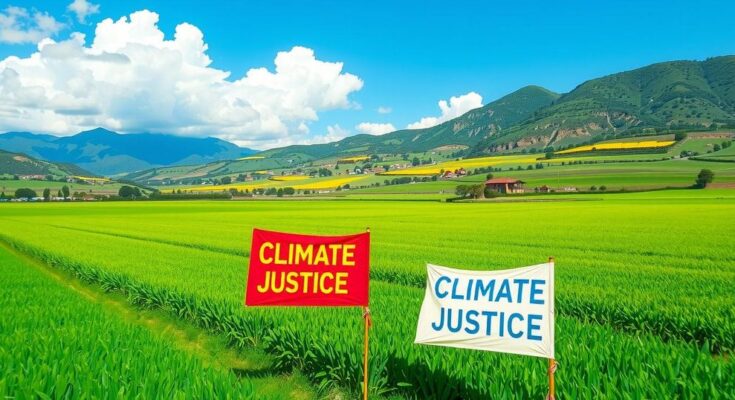Saul Luciano Lliuya, a Peruvian farmer, has initiated legal proceedings against RWE, a German energy company, claiming its carbon emissions contribute to the melting glaciers threatening his hometown, Huaraz. He seeks €17,000 to fund protection measures for Lake Palcacocha, which is at risk of overflowing. The lawsuit has the potential to establish significant precedents in corporate accountability for climate change.
On March 18, 2025, the Higher Regional Court of Hamm in Germany commenced hearings concerning a lawsuit filed by Peruvian farmer Saul Luciano Lliuya against RWE, a prominent German energy company. Lliuya alleges that RWE’s carbon emissions have contributed to the melting of glaciers in the Peruvian Andes, which imperils his community in Huaraz, located near Lake Palcacocha, a body of water increasingly at risk of overflowing due to climate change.
Lliuya contends that RWE has a responsibility to assist in funding protection measures against potential floods from the swollen glacial lake. Specifically, he seeks approximately €17,000 (approximately US$18,400) from RWE for construction costs aimed at mitigating flooding risks to more than 50,000 residents. Citing a 2014 study, he asserts that RWE is accountable for approximately 0.47% of global carbon emissions, thereby linking its industrial practices to the threats faced by his village.
The case, which represents a significant challenge for climate accountability, highlights Lliuya’s demand for corporate responsibility. “What I am asking is that the company take responsibility for part of the costs of building a dam to reduce the risks of the lake overflowing,” he stated. Initial proceedings began in 2015, but the case was previously dismissed until higher courts accepted it for reevaluation.
The hearings will first determine the extent of flooding risks to Lliuya’s property based on evidence presented by experts who assessed the impact of climate change in the region during their visit in 2022. A final determination on RWE’s liability will be made in subsequent hearings, which could establish crucial legal precedents around environmental accountability. As Francesca Mascha Klein from Germanwatch emphasized, “It is time for companies like RWE to contribute fairly to the costs of the damages they have helped cause.”
RWE has cautioned that a ruling in favor of Lliuya could set a precedent for similar claims under German law, arguing that it is not reasonable to hold them accountable for environmental damages occurring abroad. The case may well influence how future environmental responsibility and legal accountability are addressed globally, underscoring the increasing intersection of corporate practices and climate justice issues.
The ongoing lawsuit against RWE by Saul Luciano Lliuya epitomizes the urgent demand for climate justice amidst corporate accountability for environmental damages. As the case unfolds, it may set significant legal precedents regarding the responsibilities of multinational corporations towards communities adversely affected by climate change. The outcome could catalyze similar future claims, influencing corporate behavior and environmental policy on a global scale.
Original Source: andina.pe




